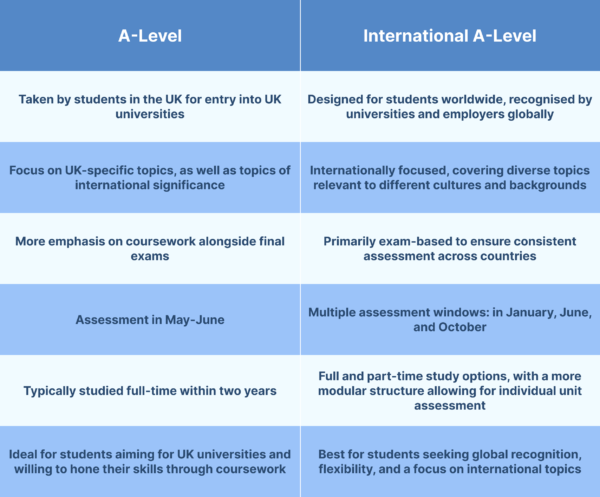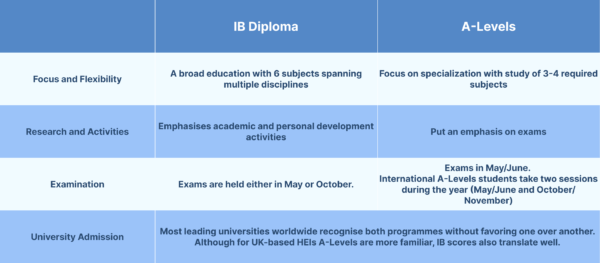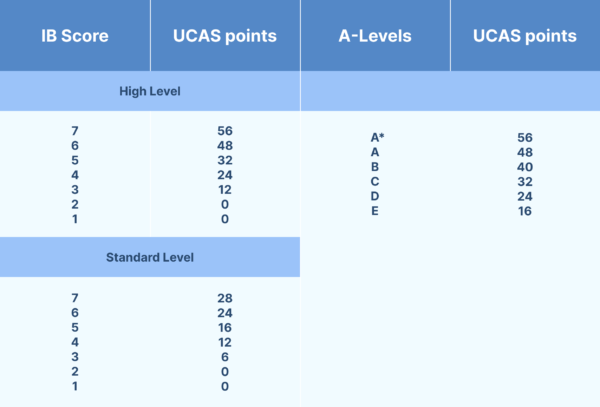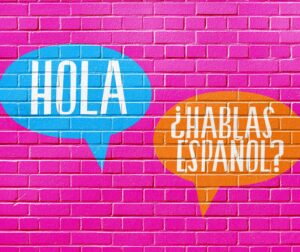Both the International Baccalaureate (IB) Diploma Programme and A-Levels have been around for decades as strong choices for high school education programmes. Both are highly acclaimed worldwide and can pave the way to the best universities.
Yet, beneath the surface, these qualifications are fundamentally different. From curriculum structure to skills developed, they take distinct approaches to prepare students for higher education. If you’re among those wondering which one to choose for the future, IB or A-Levels, this detailed guide is for you.
What are A-Levels?
A-Levels, short for Advanced Level qualifications, are in-depth, two-year programs for students from 16 to 19 years old. Being a natural continuation for GCSEs, they, however, don’t require you to stay at your previous school. You can select any school offering A-Levels. There is even an International A-Levels qualification aimed at students studying at international schools.
As an A-Levels student, you need to choose 3-4 subjects that interest you, ranging from classic subjects like English and Maths to specialised fields including Psychology or Sociology. Some students pick more subjects when they want to enter a prestigious university or apply for a competitive course (medicine, computer studies, law, etc.). Overall, you can choose from 80+ subjects.
A complete qualification has two parts: AS (Advanced Subsidiary) and A2 (Advanced) levels. In year one (AS), you cover half the content and earn an AS qualification. Year two (A2) builds on this foundation, adding more material and culminating in your final exam.
Speaking of exams, they are the primary assessment method testing students’ understanding and application of knowledge. However, some subjects might also include coursework or practical assessments to add another dimension to your learning.
Although A-Levels are a UK high school qualification, universities around the globe recognise them for entry. Naturally, the same applies to International A-Levels.
How do A-Levels Work?
To be eligible for most A-Level programmes in the UK, you need to achieve at least a grade 4 in five different GCSE subjects. Along with that, highly selective schools and specific subject combinations may have higher entry requirements.
As we have already mentioned, A-Levels consist of two parts. In Year 12, which corresponds to AS, students learn the first half of their chosen subjects. Year 12 ends with AS exams but their results don’t directly affect the final grade. Having said that, in Wales and Northern Ireland, AS marks can count for 40% of the A-Level grade.
During the second year of A-Levels (and thirteenth in school overall), students delve deeper into the remaining content. The course may include a variety of activities such as independent study and practicals. Besides, some subjects may include presentations, essays, and projects.
The end of this journey arrives with the final exams, which assess knowledge from both years.
When it comes to A-Level grades, the scale ranges from A* (highest) to E. To count for a university entrance, you need to receive at least CCC for the chosen subjects, although the majority of top Higher Education Institutions prefer a mix of As and Bs at the minimum.
What is the Difference Between International A-Levels and A-Levels?
Both A-Levels and their international version are subject-based rigorous qualifications for high-school students. The key difference between them is that A-Levels are taken in the UK, while International A-Levels are intended for students worldwide.
Specifically, the A-Levels’ content and assessments are tailored to the UK context. Exams test students on broadly the same material covered in UK classrooms. This close alignment prepares students for university and work in the UK.
In contrast, International A-Levels take a more flexible approach to accommodate varied backgrounds and cultures. The syllabus emphasises globally relevant topics, as well as provides more subject options.
The commitment to flexibility can also be seen in the assessment structures. While A-Level final exams cover 2 years, International A-Levels allow separating AS and A2 levels. On top of that, International A-Levels can feature a modular structure meaning assessment happens after each unit instead of a single final exam. Thanks to the modularity, learners receive regular feedback and can even resit individual units. Overall, higher adaptability suits international students who may study independently or move between schools.
Exams are the only assessment method for international A-Levels. Standard A-Levels, on the other hand, calculate final grades based on final exams as well as coursework and practicals.
A-Level vs International A-Level Comparison
What is the IB?
The International Baccalaureate (IB) is a globally recognised two-year qualification for high school students. First introduced in 1968 in Switzerland, it is now available in over 3,000 schools across 140+ countries. While the Diploma Programme provides vast knowledge and skills to enter universities around the globe, it also prepares graduates for life itself.
IB goes beyond giving information. Instead, it challenges you to think critically, express yourself creatively, and foster healthy relationships with others. To do so, it offers rigorous and varied coursework including individual research, essays, as well as activities reflecting your interests
Unlike A-Levels, which focus only on three or four subjects, IB students learn six. Five mandatory subjects come from each of the following groups:
- 1: Studies in Language and Literature
- 2: Language Acquisition
- 3: Individuals and Societies
- 4: Sciences
- 5: Mathematics
There is also the sixth group – The Arts. You can either take a subject from this group or an additional subject from groups 1-5.
Thanks to its prevalence and high standards of education, IB is recognised by top universities worldwide. This ensures a smooth transition to higher education institutions no matter where you are. In addition, the system is highly adaptable, allowing you to transfer across schools and countries.
How does it Work?
To earn an IB diploma, you must take six academic subjects. At least three subjects are taken at Higher Level (HL), with the rest at Standard Level (SL).
Standard Level provides a broader overview of the subject, with a focus on core concepts and essential knowledge. While studying each subject within 150 hours, students need to show understanding and application of key concepts.
High Level dives deeper into the subject and introduces more advanced concepts. With 220 hours of study time, students cover a wider range of material and carry out in-depth analysis. Besides, they have more coursework, longer exams, and higher expectations for independent learning.
Beyond 6 subjects, IB students complete three core components:
- Theory of Knowledge, a component that encourages critical thinking about the nature of knowledge across academic disciplines.
- Extended Essay is an independent 4,000-word research paper focused on a subject of your choice.
- CAS (Creativity, Activity, Service) is over 150 hours of extracurricular activities such as creative arts, sports, and community service.
IB assessment utilises a mix of final exams and coursework. While some coursework assessments are done by your teachers, external examiners rigorously ensure consistently high standards across the globe. The format of external assessment varies depending on the subject but typically involves essays, short answer questions, and problem-solving tasks.
Exams occur on the same days worldwide – May in the Northern Hemisphere and October in the Southern – but with three different time zones to avoid late-night tests.
Each IB subject assessment uses a grading scale from 1 to 7. Consequently, you can earn up to 42 on your exams. 3 additional points can come from Theory of Knowledge and the Extended Essay, which result in a maximal score of 45. To earn the full diploma, you need a minimum of 24 points.
What is the Difference Between the IB Diploma and A-Levels?
Both educational qualifications provide solid preparation for university. Yet, key differences make each programme a unique option for future academic endeavors. Here is how the IB Diploma programme and A-Levels differ:
Focus and Flexibility:
The IB offers a broad education with 6 subjects spanning multiple disciplines. This approach is ideal for students who seek well-rounded development and multifaceted skills.
Rather than providing a broad academic foundation, A-Levels focus on specialisation. With just 3-4 subjects, students are able to receive profound knowledge in the areas that align with their career path. This can be a better option for students with distinct strengths in certain subject areas, and perhaps weaknesses in others. With A-levels students can drop subjects that do not motivate them.
Research and Activities:
The IB emphasises academic and personal development activities. To earn their diploma, IB students must complete collaborative projects and a research essay. On top of that, they should give 150 hours to extracurricular activities.
In contrast, A-Levels put an emphasis on exams. Subjects like Maths, Sociology, Economics, Languages, Psychology and some others have no coursework at all. On the other hand, Sciences (Biology, Chemistry, and Physics) have a practical element.
Examination:
IB Diploma exams are held either in May or October, with results coming a month later. While this may put more stress on students, it also allows for more focused preparation. This concentrated schedule might suit students who prefer a focused period of assessment.
A-Levels students sit exams in May/June as well. Those who study International A-Levels have two sessions throughout the year (May/June and October/November). Compared to IB, results come quicker after each session.
University Admission:
Most leading universities worldwide recognise both programmes without favoring one over another. Although for UK-based HEIs A-Levels are more familiar, IB scores also translate well.
Should I take IB or A-Levels?
Both IB Diploma and A-Levels can lead to exciting possibilities. Still, it is important to understand which direction can better align with your learning style and aspirations.
IB Diploma: A Versatile Explorer
For students who want to explore varying academic disciplines, the IB Diploma offers a 360 view of knowledge. Its expansive curriculum encompassing six groups of subjects is ideal for those with varied interests or a yet-to-be-defined future path. Moreover, a mandatory language component and an emphasis on intercultural understanding help graduates thrive in global settings.
But the IB Diploma Programme isn’t just about a breadth of knowledge. Thanks to a chance to learn certain subjects at High Level, you can gain a profound understanding of critical concepts and improve your analytical skills. The Extended Essay hones your research and critical thinking skills even further, while the Theory of Knowledge promotes curiosity and allows seeing connections across various fields of study.
Finally, the Diploma Programme encourages personal and social development as well as teamwork. For example, the Creativity, Action, Service (CAS) component ensures that you’re not just a knowledgeable person but rather a well-rounded personality.
Despite all these benefits, the IB’s wider scope is often said to translate to a heavier workload. This leaves less time for activities outside of school. Besides, students have less flexibility in subject choices – you simply can’t refuse to study sciences if you are better at humanitarian subjects, and vice versa.
This means that from a tactical point of view students with weaknesses in some subject areas are penalised. Whereas, in the A-Level programme they would be able to drop these subjects, with the IB they have to continue them, even if they don’t enjoy it.
A Levels: A Focused Specialist
Are you drawn to specific subjects and want to learn them with greater depth? A-Levels give you the freedom to tailor learning to your strengths and future goals.
A-Levels recognise that not all students are made the same. Some have a natural ability for mathematics or research but are helpless when it comes to writing a literature essay. Well, with A-Levels, you don’t have to learn subjects you have zero interest in.
Thanks to fewer subjects, you are able to explore the material in greater detail, potentially surpassing the depth achieved in IB Higher Level subjects. This targeted approach is perfect if you have a specific university course or career path in mind.
At the same time, a narrower scope means missing out on an opportunity to explore areas that could spark new interests. So, a student who is an allrounder may feel limited by the more focussed curriculum.
Ultimately, choosing between IB and A-Levels isn’t about which programme is “better”. Rather, it is about which resonates with your goals. You need to consider a variety of factors before you make a decision: your learning style, areas of weakness, preferred subjects, future aspirations, the desired level of flexibility, university entry requirements, etc. Remember, whatever the path you choose should lead you to success, both in your future academic journey and the world of work. Both are good programmes.
IB vs A-Levels: Which Universities Prefer What?
Speaking of your next steps, the choice of a high school qualification makes a big difference down the line. But how can it affect your prospects of entering a university? To answer this question, let’s first look at some facts.
IB vs A-Levels in the UK
- A study by the IBO found that IB students were 3x more likely to attend a top 20 UK university compared to their A-Level peers.
- Higher Education Statistics Agency estimates the probability of admission to a top 20 university at 45.7% for IB graduates, which is 71% higher than the chances of A-Level students (32.9%).
- After enrolling, IB students had an 8% greater likelihood of achieving first-class honors.
One one hand, IB may give you an advantage if you aim for a prestigious UK university. Moreover, the demanding IB curriculum prepares for the rigors of university study and thus helps perform better.
However, in the UK the IB is more often a programme chosen by fee-paying, frequently selective schools. Therefore, this fact may explain the higher results of the IB in the UK.
In particular, the IB engenders strong research skills. A survey by ACS International Schools showed that 94% of admission officers believe that IB helps develop independent inquiry. When it comes to A-Levels, only 49% of respondents estimated this skill as ‘well or very well’ for A-Level graduates.
This doesn’t, however, mean that IB is better than A-Levels. The same studies indicate that:
- A-Level students have 12% greater chances to enroll in STEM courses than IB peers (44.2% and 39.4% respectively);
- 94% of admission officers note in-depth subject expertise in A-Level students. Only 56% said the same about the IB graduates.
IB vs A-Levels in the US
As for US universities, Ivy League schools are around 3x more likely to accept IB students compared to other applicants. The acceptance rate for top-class HEI outside of the Ivy League was even higher. There is no information on the acceptance rates specifically for A-Levels but given the fact that more than 10,000 graduates study in the US, it should be quite high.
Overall, the evidence suggests the IB programme leads to slightly better admission outcomes. However, both programmes can produce highly successful students.
IB or A-Levels Conclusion
Both the IB Diploma and A-Levels are demanding qualifications requiring dedication and commitment. However, the right attitude alone doesn’t guarantee success. If you find yourself struggling to unlock your full potential, seeking professional guidance can be a game-changer.
At TutorsPlus, we’re here to make your journey a success with personalized support and expertise. Our team of experienced tutors can help you make the most of your high school experience. Ready to maximize your academic performance? Then don’t hesitate to contact us at 022 731 8148 and info@tutorsplus.com. We can help you prepare for a strong start in the selected programme and easily navigate its intricacies until the grand finale.
FAQ
Which Programme is Most Recognised Globally?
Both IB and A-Levels have impressive global recognition. While A-Levels have a stronger foothold in the UK and Commonwealth countries, their reputation extends far beyond those borders. Similarly, the IB Diploma’s international focus ensures acceptance by universities worldwide. Interestingly, even though the International Baccalaureate programme originated in Europe, it thrives in countries like the US, Canada, and Singapore. Ultimately, the definition of the “most recognised” programme depends on your intended study destination.
How do British Universities Evaluate IB Diplomas?
British universities generally hold IB Diplomas in high regard and recognise them as strong qualifications for entry. However, since the pool of applicants have varying qualifications – IB, A-Levels, AP, and others, – the Universities and Colleges Admissions Service (UCAS) suggested so-called tariff points to evaluate the quality of their diplomas.
IB scores translate to the following UCAS points:
Higher Level:
- Grade 7 = 56 points
- Grade 6 = 48 points
- Grade 5 = 32 points
- Grade 4 = 24 points
- Grade 3 = 12 points
- Grades 2 and 1 = 0 points
Standard Level:
- Grade 7 = 28 points
- Grade 6 = 24 points
- Grade 5 = 16 points
- Grade 4 = 12 points
- Grade 3 = 6 points
- Grades 2 and 1 = 0 points
IB Core:
- Grade A = 12 points
- Grade B = 10 points
- Grade C = 8 points
- Grade D = 6 points
- Grade E = 4 points
These points directly contribute to your overall score and determine your eligibility for different programs.
Besides that, universities have specific subject grade requirements for their courses. For example, if you’d like to enroll in an Engineering programme, a university may require an IB grade of 5 and higher in high Physics.
The Core components matter as well. A strong Extended Essay may indicate your academic potential while engagement in CAS activities demonstrates well-roundedness. Either may become a decisive factor in the admission process.
Which Programme Will Help Me Get Into the Best Universities in the USA?
There’s no straightforward answer to which programme (A-Levels or IB) will guarantee entry into the best universities in the USA. Both programmes are recognised and respected by top HEI. Having said that, the likelihood of enrolling in Ivy League universities is 3 times higher for IB students than for other applicants. The numbers are even higher for non-Ivy League HEIs.
Having said that, specific US universities and even courses may have a bias towards one programme over the other. For example, there is a higher chance to be accepted at STEM courses for A-Level students due to their more profound specialised knowledge. It makes sense to research preferred universities and courses to see which qualifications can give you better prospects.
How Can IB be Converted to A-Level?
You can convert IB performance to A-Levels using UCAS points. Each score brings a certain number of points:
A passing IB score (24 points) equates to 260 UCAS points, which are simultaneously a standard admission requirement for UK universities. This is similar to CCC grades at A-Levels.
Top universities worldwide usually require at least 360 UCAS points for entry. This translates into 38 IB points and AAA for A-Levels.
The highest UCAS score is 420 points. This is 43 on the IB scale and A*A*A* at A-Levels.
Although almost every higher education institution uses UCAS points for guidance, they may interpret them differently. While a triple A* is supposed to have the same value as 43 IB points, it is significantly easier to achieve. In fact, around 10% of A-Level students hit the top score, while a slightly over 1% of IB graduates achieved the maximum. That’s why most universities have their own weights for IB and A-Level scores.
Is IB More Difficult than A-Levels?
Overall, the IB is general considered to be a more difficult qualification than A-Levels. A few factors contribute to this:
- Workload: Six IB subjects demand more time than three or four A-Levels. As a result, IB students have less free time and greater pressure.
- Coursework: Many IB subjects heavily incorporate coursework, adding extra tasks beyond classroom learning. As for A-Levels, most subjects have little to no coursework.
- Additional Requirements: Apart from exams, IB students must complete the Core component consisting of the Extended Essay (requires around 40 hours of work), Theory of Knowledge (100 hours), and CAS (150 hours). They require ongoing effort and commitment.
- Higher Top-Grade Requirements: Achieving the maximal score in IB is statistically less common than getting a triple A* in A-Levels. For example, in 2022 (the last year when IBO provided statistics for 45 points) only 1.1% of graduates hit the maximum. For comparison, the percentage of students who received 3 A* was 14.5% in 2022 and 8.6% in 2023.
The bottom line, you need extra hours and extra effort to perform well in the IB diploma programme, even though A-Levels provide a greater depth of knowledge for their subjects.

Sara has been an education consultant for TutorsPlus for 15 years, and is an expert on international IB education. She is also a parent of two lively children.













